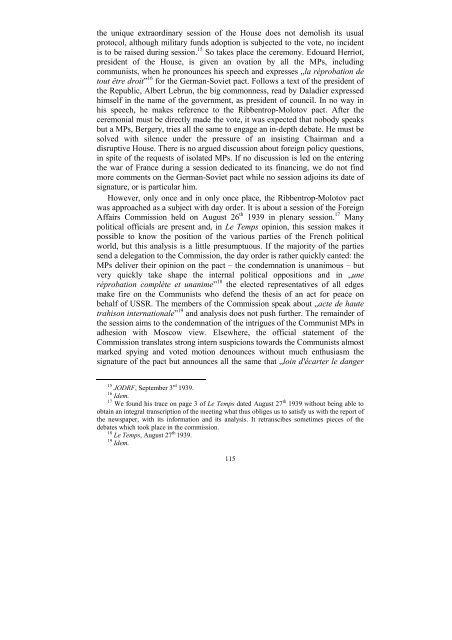The Molotov-Ribbentrop Pact - ELTE BTK Történelem Szakos Portál
The Molotov-Ribbentrop Pact - ELTE BTK Történelem Szakos Portál
The Molotov-Ribbentrop Pact - ELTE BTK Történelem Szakos Portál
You also want an ePaper? Increase the reach of your titles
YUMPU automatically turns print PDFs into web optimized ePapers that Google loves.
the unique extraordinary session of the House does not demolish its usual<br />
protocol, although military funds adoption is subjected to the vote, no incident<br />
is to be raised during session. 15 So takes place the ceremony. Edouard Herriot,<br />
president of the House, is given an ovation by all the MPs, including<br />
communists, when he pronounces his speech and expresses „la réprobation de<br />
tout être droit” 16 for the German-Soviet pact. Follows a text of the president of<br />
the Republic, Albert Lebrun, the big commonness, read by Daladier expressed<br />
himself in the name of the government, as president of council. In no way in<br />
his speech, he makes reference to the <strong>Ribbentrop</strong>-<strong>Molotov</strong> pact. After the<br />
ceremonial must be directly made the vote, it was expected that nobody speaks<br />
but a MPs, Bergery, tries all the same to engage an in-depth debate. He must be<br />
solved with silence under the pressure of an insisting Chairman and a<br />
disruptive House. <strong>The</strong>re is no argued discussion about foreign policy questions,<br />
in spite of the requests of isolated MPs. If no discussion is led on the entering<br />
the war of France during a session dedicated to its financing, we do not find<br />
more comments on the German-Soviet pact while no session adjoins its date of<br />
signature, or is particular him.<br />
However, only once and in only once place, the <strong>Ribbentrop</strong>-<strong>Molotov</strong> pact<br />
was approached as a subject with day order. It is about a session of the Foreign<br />
Affairs Commission held on August 26 th 1939 in plenary session. 17 Many<br />
political officials are present and, in Le Temps opinion, this session makes it<br />
possible to know the position of the various parties of the French political<br />
world, but this analysis is a little presumptuous. If the majority of the parties<br />
send a delegation to the Commission, the day order is rather quickly canted: the<br />
MPs deliver their opinion on the pact – the condemnation is unanimous – but<br />
very quickly take shape the internal political oppositions and in „une<br />
réprobation complète et unanime” 18 the elected representatives of all edges<br />
make fire on the Communists who defend the thesis of an act for peace on<br />
behalf of USSR. <strong>The</strong> members of the Commission speak about „acte de haute<br />
trahison internationale” 19 and analysis does not push further. <strong>The</strong> remainder of<br />
the session aims to the condemnation of the intrigues of the Communist MPs in<br />
adhesion with Moscow view. Elsewhere, the official statement of the<br />
Commission translates strong intern suspicions towards the Communists almost<br />
marked spying and voted motion denounces without much enthusiasm the<br />
signature of the pact but announces all the same that „loin d'écarter le danger<br />
15 rd<br />
JODRF, September 3 1939.<br />
16<br />
Idem.<br />
17 th<br />
We found his trace on page 3 of Le Temps dated August 27 1939 without being able to<br />
obtain an integral transcription of the meeting what thus obliges us to satisfy us with the report of<br />
the newspaper, with its information and its analysis. It retranscibes sometimes pieces of the<br />
debates which took place in the commission.<br />
18 th<br />
Le Temps, August 27 1939.<br />
19 Idem.<br />
115













